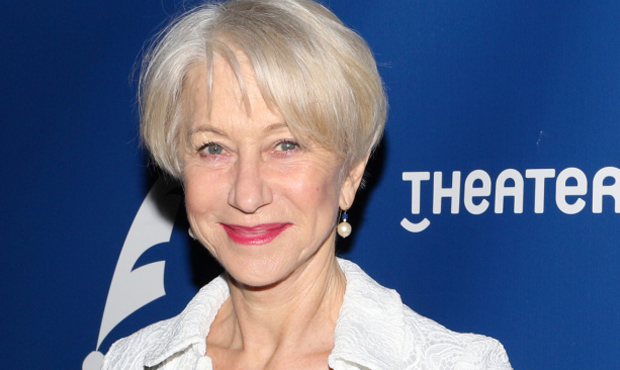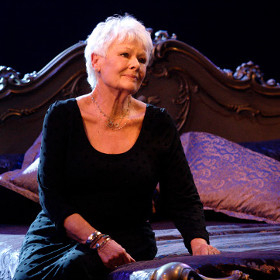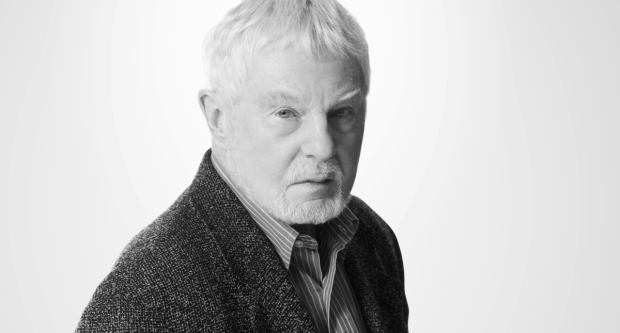Michael Coveney: Old actors bloom as Helen Mirren and Ken Cranham prove 70 is the new 40

© David Gordon
We used to talk about the pink pound in the theatre but there's a growing chorus of approval for the grey pound and discussion about Theatre and the Third Age; old folk carry on going to the theatre, but many old actors are feeling left out in the cold even though they want to carry on working.
We're not just talking here about Helen Mirren turning seventy – no sign of her taking to a bath chair any time soon – but even older actors creating new circumstances for themselves, and I've noted two important new initiatives: the first is James Roose-Evans's Frontier Theatre Productions which plans to present theatre for the older actor (and younger audience) at the So and So Arts Club at Frederick's Place in the City of London, starting with Mercy by Clare Whitehead in September. (And watch out for an upcoming interview with sprightly 87 year-old Roose-Evans, the founder of Hampstead Theatre, on WOS soon.) There's also a programme of workshops and talks starting this very night (30 July) with Sam Walters, former artistic director of the Orange Tree, asking "Is Your Director Really Necessary?"
Sam's Orange Tree has taken on a new lease of life under Paul Miller, despite losing its Arts Council grant, and there's a sense that this is a welcome development, especially as it seems to be attracting a much younger audience. But there's an element of ageism, too, in the critical targeting of the old Orange Tree as a place where old people watched mostly old plays (that's not really true) and missed out on the trendy zeitgeist, whatever that is, though it may involve Simon Stephens.
The second initiative, as reported in The Stage last week, is Sonja Linden and Sue Lefton's Visible Theatre, based in north London, which aims to give a more diverse representation of old age, says Linden, harnessing the resources of older actors, and saying to younger people, "Please rethink your attitude to the old. This is who we are."
Actually, it seems that old actors are where it's increasingly at. All the dames in their eighties — Judi Dench, Eileen Atkins and Maggie Smith — are indomitably busy, though we pause this week to mourn the passing of 84 year-old Natasha Parry, an elegant and beautiful actress married to Peter Brook (and the mother of director Irina Brook), who accompanied and collaborated with Brook on all his greatest adventures in Africa (together with a young Mirren), pre-revolutionary Iran and the Bouffes du Nord in Paris; she was a wonderfully vibrant Ranevskaya in The Cherry Orchard and one of the best ever Winnies in Beckett's Happy Days, certainly the best French-speaking one since the legendary Madeleine Renaud, who died aged 94 twenty years ago.
In theatre and film, as in life, we seem to be at the start of a more wistful, melancholic and perhaps surprising investigation into the attributes, and occasional disadvantages, of growing older and wiser with a modicum of grace and good will. Hence, over the past ten years, the growth of over-age choirs, often in festival circumstances, and pensioner re-writes of Romeo and Juliet and Much Ado – Sian Phillips played Juliet aged 79 at the Bristol Old Vic, Vanessa Redgrave played Beatrice aged 76 in an elderly Much Ado at the Old Vic, and Derek Jacobi will be 77 when he plays Romeo’s tearaway buddy Mercutio in the Kenneth Branagh season at the Garrick next May – property porn television programmes about where to go and live when you retire, and senior citizen television sitcoms like Mark Ravenhill’s Vicious with Ian McKellen and Jacobi as a pair of old theatrical queens, surprisingly, and the hugely popular Last Tango in Halifax (Jacobi again, this time married to the peerless Anne Reid who, unbelievably aged 80, has re-branded herself as a cabaret performer, too).
The film careers, rather than the stage careers, of Maggie Smith and Judi Dench, have embraced this process of ageing with no loss of vitality in movies they have graced together such as Ladies in Lavender ("We're the lavender bags," said Maggie) through to the two wildly successful Best Exotic Marigold movies without suggesting that being old was a side effect of being wilfully eccentric or tragically over the hill.
So far, perhaps, it's the movies creating the most potent new work for the oldsters. Michael Gambon (only 74) says he can't learn lines in the theatre anymore and, only this week, the great American film star Morgan Freeman, 78, told the Daily Telegraph that he would never set foot on any stage ever again; a few years ago, a Broadway revival of Clifford Odets's The Country Girl in which he co-starred with Frances McDormand and Peter Gallagher bristled with reports of back stage turbulence and actors fluffing their lines.
All the same, as we all live longer, hopefully, we may have to adjust the age at which actors are said to be in their prime — even actors on the brink of middle-age (Simon Russell Beale, Michael Sheen, Benedict Cumberbatch next month) now play the archetypal young man's lead role, Hamlet — and that could well be three-score and ten; just look at Mirren, and what about Kenneth Cranham, also 70, giving the performance of his life as an Alzheimer's victim in Florian Zeller's The Father (translated by Christopher Hampton), moving in triumph from the Theatre Royal Bath, via the Tricycle in Kilburn, into Wyndham's in the West End at the end of September? The golden boy of the Royal Court in plays by Joe Orton and Edward Bond has come into his kingdom and, I wager, some serious acknowledgement when the theatre awards season kicks in as winter draws on.












